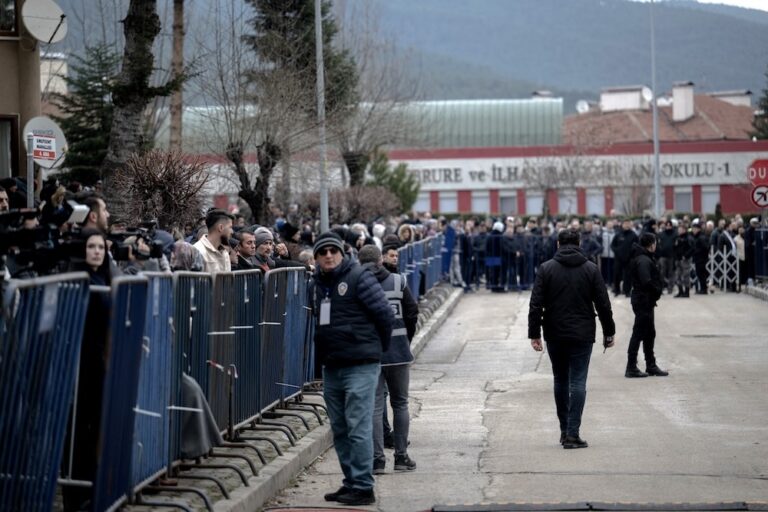During her first official visit to Turkey, Dunja Mijatovic participated in a panel discussion entitled "Turkey and Freedom of Expression", organised by the Ankara University Faculty of Political Sciences.
(BIANET/IFEX) – 15 December 2011 – During her first visit to Turkey, Dunja Mijatovic, OSCE Representative on Freedom of the Media, participated in a panel discussion entitled “Turkey and Freedom of Expression”. The event was organized by the Ankara University Faculty of Political Sciences (SBF) and hosted by Ass. Prof Kerem Altiparmak.
Mijatovic drew attention to the importance of her first official visit to the country and said, “This is our first official visit to Turkey related to press freedom. I came here with a small but energetic team. It is an important step that we are here”.
At the beginning of her speech, she introduced the Organization for Security and Co-operation in Europe (OSCE) and described it as the world’s only intergovernmental organization that monitors the media in the world and has a mandate for press freedom. “The OSCE has 56 member states and I talk to the government officials of these countries. If the governments of the OSCE member states do not fulfil their duty of press freedom in any way, it is my job to voice criticism in my field of responsibility”, Mijatovic explained.
She remarked that the OSCE was not a non-governmental organization but an independent institution that maintained a good co-operation with governmental institutions.
According to Mijatovic, many journalists are being imprisoned guiltlessly in Turkey. She pointed to a database regarding detained journalists published by the OSCE in March noting, “It includes information on journalists and other persons in prison. I discuss this situation with the governments of the member states. I hope we will reach a solution. This is an important problem for the Turkish society”.
International commitments should be fulfilled to pave the way to solve these problems, Mijatovic said and emphasized that a quick advancement would be possible that way. If information was being concealed on the other hand, a solution could not be reached, she argued.
Mijatovic highlighted the importance of free information flow, access to information and freedom of communication. The OSCE representative talked to Turkish officials about problems such as the internet filtering system and access bans to web sites. She suggested a number of recommendations and the talks are still going on, Mijatovic informed the audience. She indicated there had been some positive developments in this aspect in Turkey throughout the past year, pointing to the internet filtering system that was initially considered compulsory for all internet users and was made optional later on. “There is a long way ahead in solving the problems of the internet environment for real freedom of the media”.
Mijatovic expressed her belief that a certain procedure should be required for locking up people in prison: “I visit journalists in prison. The situation is not bright in any of the 56 OSCE member states. In Russia, the police intervened against journalists after the election. In Tajikistan, two journalists went to jail on the grounds of their articles on community-related topics, terrorism and corruption. They were released after diplomatic talks but this is a short-term solution. Political will and change is needed to solve this problem completely. Therefore, officials need to be transparent with regards to the law”.
Mijatovic stressed the benefit of studying OSCE publications and reports and encouraged the audience to visit their daily updated websites. A Facebook site is going to be launched soon which is an important means to also familiarize young people with the structure of the OSCE press office, she announced.
After her speech, Mijatovic answered questions during the panel discussion. Host Kerem Altiparmak mentioned the recently increased number of trials filed by Turkish politicians related to alleged insult and compensation claims. Mijatovic commented, “I do not find compensation claims by top ranking officials appropriate. ( . . . ) They should be aware of their responsibility and [be tolerant to] a high level of criticism”.
One participant asked if the visit to Turkey was a matter of courtesy or aimed at recommending a concrete solution. Mijatovic was also asked whom she was going to talk with. She replied, “Our visit is definitely not a matter of courtesy. We advocate for press freedom and we came to Turkey to suggest a concrete solution. We are very clear on this. There are many ways to contribute and we have to work together. Even if completely abolishing a law and designing new regulations is not in question, we request the amendment of certain articles. There is an open dialogue but it is very important to achieve tangible results. I am going to talk to the Minister of the Interior on [Thursday, 15 December]. Additionally, I am going to meet journalists in prison and non-governmental organizations in Istanbul”.
Subsequent to the panel discussion, Mijatovic set off for a meeting with the Minister of Justice.


